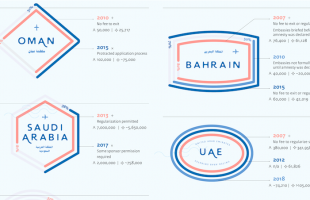This article was originally published on Mideastyouth.com by Tasbeeh Herwees.
Libya’s Tripoli Zoo has been back in operation for a while, but post-revolution, the zoo’s facilities don’t just hold animals. A portion of the zoo has been appropriated for use as a holding center for illegal immigrants under the custody of 43 brigades. According to the Libya Herald:
The prison itself, on the edge of the grounds of the zoo, has heavily-barred doors and windows. Inside, however, it is surprisingly light, with two air-conditioned rooms, a sink and toilet, and supplies of bottled drinking water. An ironic sticker, grazed by a gunshot hole, on one of the doors advertises a Libyan tourism company.
The center, however, is indicative of a larger problem: Libya’s growing refugee crisis. As they continue to receive political refugees from Syria, the North African nation is also attempting to stem the flow of refugees who’ve long been arriving from sub-Saharan Africa and other parts of the Maghreb. Unfortunately, a recent Amnesty International report documented the substandard conditions the migrants and refugees suffer under the current immigration process. With no constitution, Libya’s most vulnerable members are exposed to the abuses of power and migrants, who are not even afforded the protection citizenship offers, are particularly defenseless. The report detailed arbitrary arrests, lack of due process, torture as well as poor conditions in the detention facilities in which the migrants are held:
Conditions observed in most “holding centres” visited by Amnesty International delegates fell short of international standards, and at times amounted to cruel, inhuman and degrading treatment. Foreign nationals were held in overcrowded cells, often without regular access to fresh air; many suffered from irregular access to washing and sanitary facilities and insufficient access to drinking water, hygiene products and other basic necessities. Poor hygiene standards and detention conditions have led to the spread of skin diseases and other medical problems, which have been exacerbated by insufficient treatment, and at times the denial of treatment altogether.
Libya’s problematic illegal immigration policies predate the 2011 overthrow of Colonel Muammar Gaddafi. In 2009, Human Rights published an extensive report titled “Pushed Back, Pushed Around” that detailed the mistreatment of migrants and asylum seekers in Libya. The report followed the migrants all the way to Italy and Malta, where immigration authorities often force the migrants to turn back.
Libya has no asylum law or procedures. There is no formal mechanism for individuals seeking protection in Libya. The authorities make no distinction between refugees, asylum seekers, and other migrants. Brigadier General Mohamed Bashir AlShabbani,the director of the Office of Immigration at the General People’s Committee for Public Security, told Human Rights Watch, “There are no refugees in Libya.” He said, “They are people who sneak into the country illegally and they cannot be described as refugees.” He added, “Anyone who enters the country without formal documents and permission is arrested.”
Once under arrest, the migrants were often vulnerable to corrupt policemen and officials, who had been known to beat and abuse those in their custodies. They suffered the same in detention centers, which were “overcrowded and dirty” and where the food was “inadequate” and the health care “virtually non-existent”. Migrants once again suffered abuses under the detention center guards. There are even cases of the migrants being transported to the border and “dumped”, with very few resources to help their survival.
In today’s “lawless Libya”, legal boundaries concerning illegal immigrants have become ever more vague and ambiguous, at the expense of the migrants. Much of these institutional practices and attitudes towards migrants persist today, in several makeshift detention centers around the country. It’s often difficult to tell whether the militiamen who carry out these policies are government-employed or armed vigilantes.
Anti-black racism, prevalent in North Africa and other parts of the Middle East, and perpetuated by Gaddafi and his administration’s institutional policies for 40 years, plays a role in these power dynamics. Characterizations of sub-Saharan blacks as ignorant and scheming fuel vitriol against migrants and help galvanize support for anti-immigrant policies. Many sub-Saharan Africans also played a role in the revolution, exploited by the Gaddafi regime, and popular prejudice continues to paint them as counter-revolutionaries and pro-Gaddafi subversives, even after the dictator’s death. Libya’s anti-immigrant policies and procedures have served to dehumanize them, both by the system and the people who carry out the system.
One thing has changed since then, however: there is now some nuance to how officials recognize migrants. Some are recognized as refugees:
“We cannot return these people to their countries because they have refugee status,” Abdul Razag Al-Gerjame [head of the illegal immigration unit based at the zoo] said, “so we have to keep them here in Libya.” Workers from Eritrea, Ethiopia and Somalia also cannot be sent home. “This is Libya’s biggest problem,” Al-Gerjame said, “and we have asked the United Nations for help but nobody has any answers.”
But are the accommodations Libya has to offer them really better than the ones they suffered in the home countries from which they seek asylum? Just last July, three migrants were shot at as they were trying to flee a detention centre — perhaps understandably, considering the conditions they must have suffered there. The Libya Herald has reported on their situations in places like the Abu Rashada Detention Centre. They witnessed over fifty migrants crammed into a small rectangular space and one migrant worker told them they were being fed well.
“Tell the authorities that people here want to go back home,” another one shouted.




